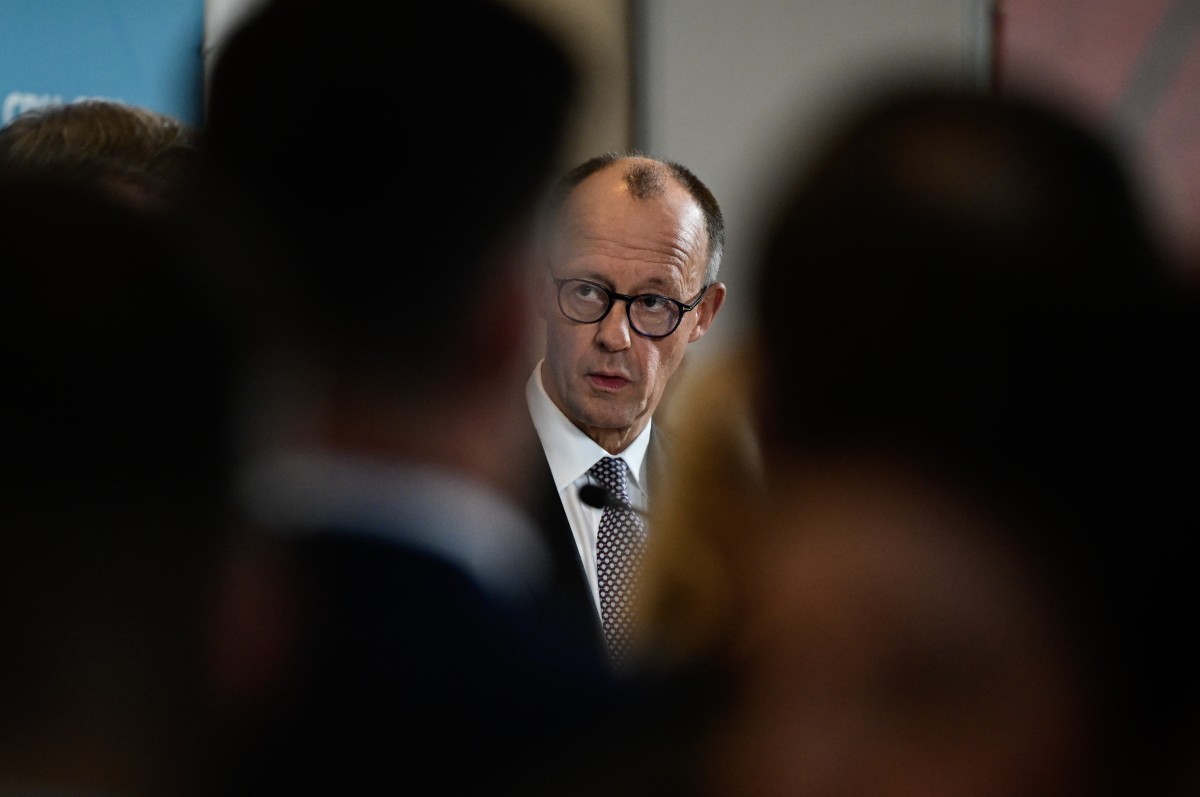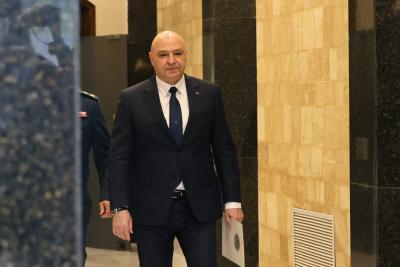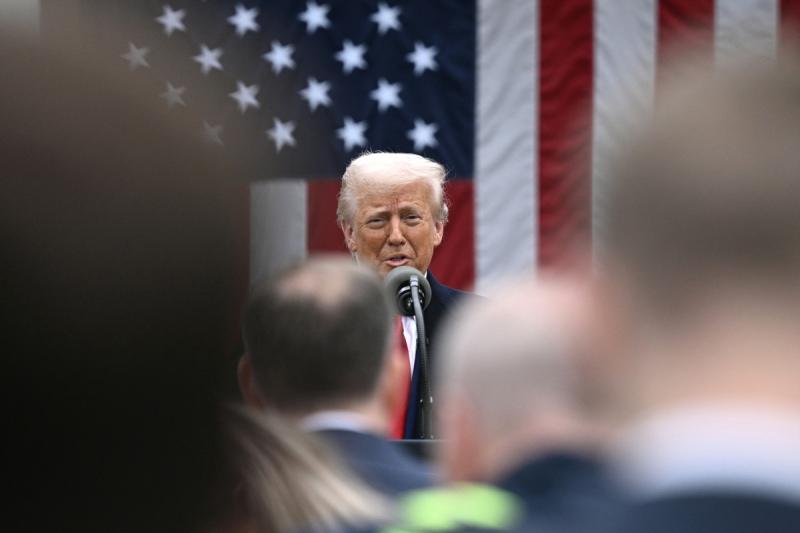The German federal elections held on February 23, 2025, marked a significant shift in the country's political landscape. The Christian Democratic Union (CDU), led by Friedrich Merz, emerged as the largest party, securing a crucial position to form the next government. However, no party achieved a majority, necessitating coalition negotiations.
Chart one: results of the German federal elections 23/2/2025
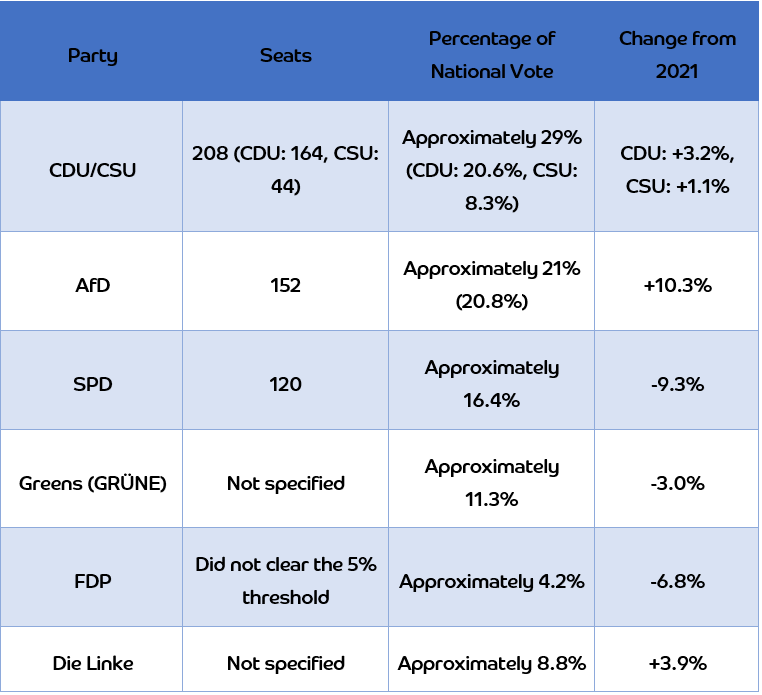
Election Results Overview
CDU/CSU Victory: The CDU, alongside its Bavarian ally the Christian Social Union (CSU), secured the highest vote share, positioning Friedrich Merz as a strong candidate to become the next chancellor. The CDU/CSU alliance garnered approximately 28.5% to 28.6% of the votes.
AfD's Rise: The Alternative for Germany (AfD) saw a substantial increase in support, finishing second with about 20% of the vote. This marks a significant rise from previous elections, reflecting growing dissatisfaction with mainstream parties and concerns over migration.
SPD's Decline: The Social Democratic Party (SPD), led by outgoing Chancellor Olaf Scholz, experienced its worst showing in decades, securing only about 16% of the vote. This decline underscores the challenges faced by traditional center-left parties in Germany.
Record Turnout: Voter turnout was exceptionally high at 83.5%, the highest since German reunification in 1990, indicating heightened public engagement and polarization.
Political Implications for Germany
This fragmented federal parliament requires coalition building efforts as the CDU/CSU will need to form a coalition to govern, which could involve negotiations with smaller parties like the Greens or the Free Democratic Party (FDP). This process may be complex, given the diverse political landscape and the need to address pressing issues such as immigration and economic policy.
At the same time, there will be a leadership change as Friedrich Merz is poised to become the next chancellor, marking a shift from the SPD-led coalition under Olaf Scholz. Merz's leadership could lead to more conservative policies, potentially impacting areas like migration and climate change.
During all the expected political wrangling, AfD's Influence should not be overlooked. Yet, despite its significant gains, the AfD remains isolated from coalition talks due to its controversial stance on issues like immigration and EU membership. However, its increased presence in parliament could influence policy debates, particularly on migration and national identity.
Chart 2: progression / regression of political parties (3031-20245)
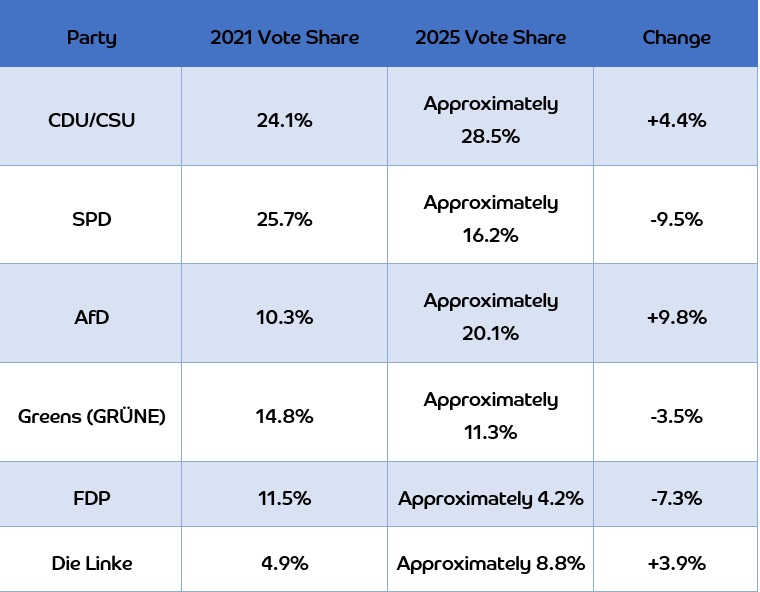
Economic Implications for Germany
A CDU-led government might introduce reforms to immigration laws, potentially tightening rules while encouraging skilled migration. This policy shift could impact labor markets and economic growth.
Also, the CDU has expressed skepticism about the pace of Germany's green transition, which could lead to adjustments in climate policies. This might affect the auto industry and other sectors facing high green energy costs.
The election outcome could boost market sentiment in the short term due to increased policy certainty. However, prolonged coalition negotiations could dampen investment sentiment and impact the euro.
Implications for Europe
Germany's role in the EU is crucial, and the election outcome could influence its stance on European policies. A more conservative German government might push for reforms within the EU, potentially affecting its relationships with other member states.
As one of the EU's largest economies, Germany's economic policies have a ripple effect across Europe. Changes in German economic strategy could impact trade and economic stability within the EU.
The same could also be said about the EU's security and stability, which are closely tied to Germany's leadership. A stable German government is essential for maintaining the EU's role in global affairs and supporting its security initiatives.
Implications for the War in Ukraine
The German election outcome could impact European unity on Ukraine-related issues. A strong German leadership is crucial for maintaining EU cohesion in supporting Ukraine against Russian aggression.
Germany's economic policies, particularly those related to energy and trade, could influence the effectiveness of EU sanctions against Russia. A shift in German policy might alter the dynamics of these sanctions.
And as a key player in European diplomacy, Germany's stance on Ukraine could influence peace negotiations and efforts to resolve the conflict. A CDU-led government might adopt a different approach to diplomatic engagement with Russia.
And Now What?
In the unlikely scenario with the SPD, Greens, and FDP retaining sufficient seats, they might renew their coalition. This hinges on reconciling differences, such as the FDP's fiscal conservatism and insistence on debt brakes, with the Greens' climate ambitions and push for more Green investments.
If the CDU/CSU emerges as the largest party, it could partner with the Greens and FDP. This coalition was attempted in 2017 but collapsed due to FDP disagreements.
If neither bloc secures a majority, a CDU/CSU-SPD coalition might emerge. Historically unpopular due to voter fatigue with "status quo" politics, this option remains a fallback. If such a scenario materializes, it could marginalize smaller parties and fuel support for AfD/The Left.
 French
French






